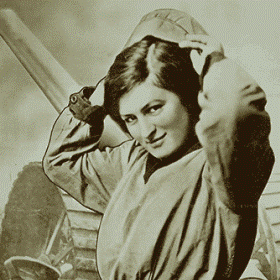Catherine Love: Commemorating conflict
Theatres around the country are rushing to mark the centenary of the First World War, but how many of these shows really have something to say about the conflict?

Even if you’re not good with dates, you can hardly fail to notice that this year marks the centenary of the outbreak of World War I. The 100 year anniversary is being commemorated with countless events, exhibitions and books, alongside a fresh outpouring of opinion from all sides about the nature of the conflict. Only a month and a bit into the year, it is already ubiquitous.
Theatre is getting in on the act too. What The Women Did at Southwark Playhouse, a trio of plays looking at the experiences of women during the Great War, is already nearing the end of its run, while a new production of Joan Littlewood’s landmark show Oh What a Lovely War is currently playing at Theatre Royal Stratford East. Other offerings on the way include Peter Gill’s new play Versailles at the Donmar Warehouse, a second national tour for the stage adaptation of Sebastian Faulks’ Birdsong, and Royal & Derngate’s co-production of Regeneration – to name just a few. Then there’s War Horse, which continues to be a massive hit on the West End as well as touring the country.
There is, of course, the argument that all this noise is necessary to stop us forgetting the horrific loss of life that the war involved. It feels particularly important to highlight this in the face of commemorative events that threaten to glorify the conflict, a danger flagged up by Michael Gove’s idiotic comments on the subject at the beginning of the year. The Education Secretary’s insistence on the justness of Britain’s involvement in the First World War and his accusation that the likes of Blackadder and Oh What a Lovely War are simply left-wing propaganda persuasively demonstrate why reminders of the war’s devastation remain crucial.
My cynical side, however, can’t help suspecting that – as grossly inappropriate a term as this is for the context being discussed – First World War theatre is becoming something of a “trend”. By that I mean that I find myself wondering whether some theatres might be programming revivals or new responses to the Great War simply because it is topical rather than because they particularly have anything significant to contribute. It would not be the first time that venues have succumbed to timeliness for the sake of it, after all; I’ve lost count of the number of productions which loudly trumpet their urgency but seem to have very little to say about the hot topic they have identified.
How many of the dozens of centenary theatre productions, I wonder, really have a point to make about the First World War? Commemoration is clearly important, but too much of it can become deadening, ironically undermining its own intentions. If theatres are just jumping on the bandwagon, they could be doing more harm than good to the events they are hoping to mark. Of course, it’s impossible to judge before attending any of the shows in question, and I sincerely hope to be surprised by their historical insight and contemporary relevance. Still, I think it’s worth asking: when does topicality stop being a virtue of theatre’s ability to respond and simply become a convenient gimmick?












